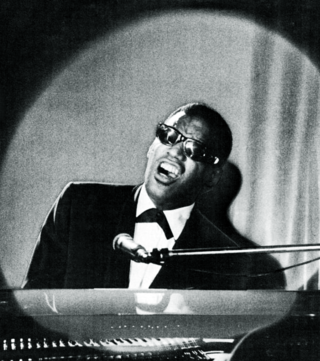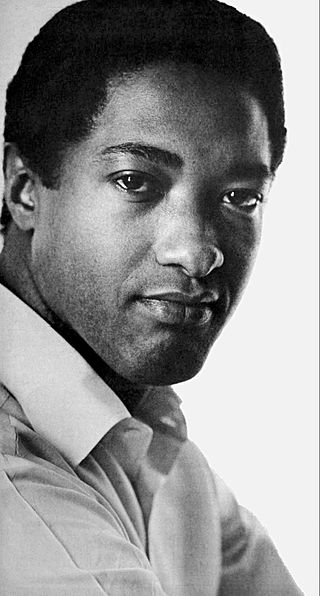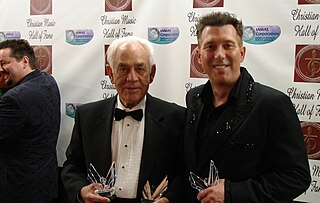
Soul music is a popular music genre that originated in the African-American community throughout the United States in the late 1950s and early 1960s. It has its roots in African-American gospel music and rhythm and blues. Soul music became popular for dancing and listening, where U.S. record labels such as Motown, Atlantic and Stax were influential during the Civil Rights Movement. Soul also became popular around the world, directly influencing rock music and the music of Africa. It also had a resurgence in the mid-to late 1990s with the subgenre neo-soul, which added modern production elements and influence from hip-hop.

Samuel Cooke, known professionally as Sam Cooke, was an American singer and songwriter. Considered one of the most influential soul artists of all time, Cooke is commonly referred to as the "King of Soul" for his distinctive vocals, pioneering contributions to the genre, and significance in popular music. During his eight-year career, Cooke released 29 singles that charted in the Top 40 of the Billboard Pop Singles chart, as well as 20 singles in the Top Ten of Billboard's Black Singles chart. In 1964, Cooke was shot and killed by the manager of a motel in Los Angeles. After an inquest and investigation, the courts ruled Cooke's death to be a justifiable homicide. His family has since questioned the circumstances of his death. Cooke is included on Billboard's 2015 list of the 35 greatest R&B artists of all time.

Sam & Dave were an American soul and R&B duo who performed together from 1961 until 1981. The tenor (higher) voice was Sam Moore and the baritone/tenor (lower) voice was Dave Prater (1937–1988).
Gospel music is a traditional genre of Christian music, and a cornerstone of Christian media. The creation, performance, significance, and even the definition of gospel music varies according to culture and social context. Gospel music is composed and performed for many purposes, including aesthetic pleasure, religious or ceremonial purposes, and as an entertainment product for the marketplace. Gospel music is characterized by dominant vocals and strong use of harmony with Christian lyrics. Gospel music can be traced to the early 17th century.

Thomas Andrew Dorsey was an American musician, composer, and Christian evangelist influential in the development of early blues and 20th-century gospel music. He penned 3,000 songs, a third of them gospel, including "Take My Hand, Precious Lord" and "Peace in the Valley". Recordings of these sold millions of copies in both gospel and secular markets in the 20th century.

Jerry Butler Jr. is an American soul singer-songwriter, producer, musician, and retired politician. He was the original lead singer of the R&B vocal group the Impressions, inducted into the Rock and Roll Hall of Fame in 1991. After leaving the group in 1960, Butler achieved over 55 Billboard Pop and R&B Chart hits as a solo artist including "He Will Break Your Heart", "Let It Be Me" and "Only the Strong Survive". He was inducted into the National Rhythm & Blues Hall of Fame in 2015.

The Dixie Hummingbirds are an influential American gospel music group, spanning more than 80 years from the jubilee quartet style of the 1920s, through the "hard gospel" quartet style of gospel's golden age in the 1940s and 1950s, to the eclectic pop-tinged songs of today. The Hummingbirds inspired a number of imitators, such as Jackie Wilson and James Brown, who adapted the shouting style and enthusiastic showmanship of hard gospel to secular themes to help create soul music in the 1960s.

The Golden Gate Quartet is an American vocal group. It was formed in 1934 and, with changes in membership, remains active.
Southern gospel music is a genre of Christian music. Its name comes from its origins in the southeastern United States. Its lyrics are written to express either personal or a communal faith regarding biblical teachings and Christian life, as well as to give a Christian alternative to mainstream secular music. Sometimes known as "quartet music" for its traditional "four men and a piano" set up, southern gospel has evolved over the years into a popular form of music across the United States and overseas, especially among baby boomers and those living in the Southern United States. Like other forms of music, the creation, performance, significance, and even the definition of southern gospel varies according to the cultural and social context. It is composed and performed for many purposes, ranging from aesthetic pleasure, religious or ceremonial purposes, or as an entertainment product for the marketplace.
The Pilgrim Travelers were an American gospel group, popular in the late 1940s and early 1950s.
The Five Blind Boys of Mississippi was an American post-war gospel quartet. They started with lead singer Archie Brownlee, their single "Our Father" reached number ten on the Billboard R&B charts in early 1951. Then the screams of their new lead singer Big Henry Johnson captivated audiences all over the world. Jimmy was the heart of the group and the longest standing member. It was one of the first gospel records to do so.

Les Beasley was an American Southern Gospel musician. From 1953 to 2007 he was the lead singer, bass guitarist, and manager for the Florida Boys. He was considered to be one of the pioneers of Gospel Music TV.
"There'll Be Peace in the Valley for Me", also known informally as "Peace in the Valley" is a 1939 song written by Thomas A. Dorsey, originally for Mahalia Jackson. In 1951, a version of the song by Red Foley and the Sunshine Boys was a hit, and among the first gospel recordings to sell one million copies. Elvis Presley performed the song at the close of his third and final appearance on The Ed Sullivan Show, which reached 54.6 million viewers. The song has become one of the ten best-known gospel standards of all time, and has been performed and recorded by numerous artists.
Traditional black gospel is music that is written to express either personal or a communal belief regarding African American Christian life, as well as to give a Christian alternative to mainstream secular music. It is a form of Christian music and a subgenre of black gospel music.
Paul Foster was born in Grand Cane, Louisiana. He sang with the legendary gospel group, the Soul Stirrers, from 1950 to 1963. Foster sang second lead alongside two other gospel greats, Rebert Harris and Sam Cooke. Foster possessed a powerful, mournful tenor voice, a perfect foil to both Harris' and Cooke's sweeter more-flowery tenor styles. During his long career in gospel music, Foster also sang for other quartets such as the Rising Stars and the Golden Echoes. While nearly all of Foster's recordings take place in the recording studio, his powerful voice can be heard on the Soul Stirrers' dynamic performance on the album "The Great Shrine Concert of 1955", especially on the song "Be With Me Jesus", where Foster leads the group with his strong testimonial style.
Rebert H. Harris was an American gospel artist and lead singer of the Soul Stirrers. He had a pure tenor three-octave voice that he utilized for moans and slurs and leaps into falsetto. He was instrumental in transforming the ensemble jubilee quartet style of the 30s into the lead-focused hard gospel style of the 40s and 50s. He was inducted into the Rock and Roll Hall of Fame in 1989 as a member of the Soul Stirrers; the group was also inducted into the Vocal Group Hall of Fame in 2000. He was the fountainhead of numerous gospel and soul singers, and direct model to Sam Cooke, who replaced him as lead singer of the Soul Stirrers.
The Highway Q.C.'s is an American gospel group that has been active for over 70 years. Its members sing in the tradition of jubilee quartets, though they have also added instrumental accompaniment. The group helped launch the careers of several secular stars, including Lou Rawls, Johnnie Taylor and Sam Cooke.
James Woodie Alexander II, was an American singer, musician, songwriter, record producer and entrepreneur who was a key figure in the development of gospel and soul music, most notably through his close association with Sam Cooke.
Ernest Phipps (1900–1963) was an Old-time Country musician and Southern Gospel singer best known for his recordings at the Bristol Sessions in 1928.
"My Lord's Gonna Move This Wicked Race" / "My Lord's Going to Move This Wicked Race" is a spiritual song that has been recorded by various groups. It was recorded for the Ozark Folksong Collection in 1951.







